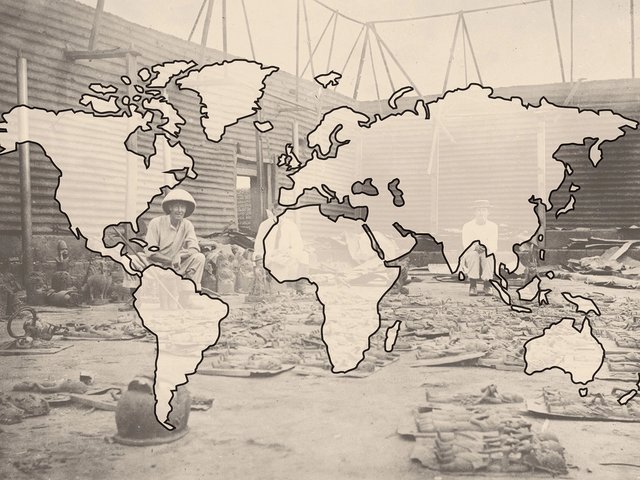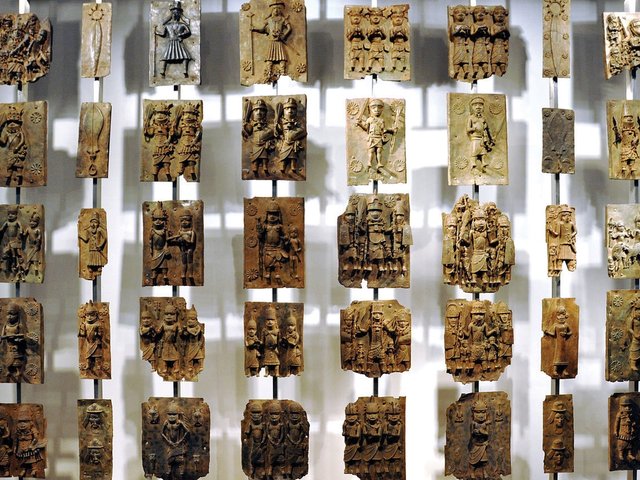On 30 November last year, following a decision by Prime Minister John Major, the Stone of Destiny, the most ancient extant symbol of the Scottish kings, was removed from King Edward’s chair in Westminster Abbey, where it had been for the past 700 years, and returned to Scotland. Museum directors in the UK are bracing themselves for the flood of demands for repatriation that this move may have released. Over the last few months, Labour MP, Bernie Grant, chair of the African Reparations Movement (UK), has contacted museums throughout Britain, most notably the British Museum and Kelvingrove Art Gallery in Glasgow, to ask for the return of ceremonial sculptures looted by the British in 1897 from the ancient kingdom of Benin (now part of Nigeria). His move follows an appeal for help from the Oba of Benin who argues that the pieces are necessary for the performance of rituals that are part of his people’s living culture. Mr Grant has met with no success so far. The Art Newspaper has been allowed sight of the letters.
What Bernie Grant MP said to Julian Spalding...
10 December 1996
...I write on behalf of the Oba of Benin, Oma n’Oba, Uku Akpolokpolo, Oba Erediauwa, and on behalf of the Africa Reparations Movement (UK), ARM UK, of which I am the Chair. The subject of this letter is the Benin bronzes, ivories and other cultural and religious objects contained in the Glasgow Art Gallery and Museum.
...As you are aware, most of the Benin religious and cultural objects currently in British museums and other institutions, were looted in February 1897 from Benin City. The context of this was the battle for trade in the carve up of Africa, into “spheres of influence”, by the European powers, and the launching of a military expedition by the British in 1897, to depose the King of Benin who insisted on preserving the independence and sovereignty of his kingdom.
The Benin religious and cultural objects belong to a living culture and have deep historic and social value, which go far beyond the aesthetic and monetary value which they hold in exile. I was recently informed by Prince Akenzua, the Oba’s brother, who was in the UK on a quest to speak to MPs regarding the return of the bronzes, that those officiating at the Oba’s coronation ceremonies had forgotten the rituals. They had had to consult some of the bronzes that are still in Benin, in order for them to wear the correct vestments and have the appropriate officials present.
Prince Akenzua explained that the previous coronation had been well over fifty years previously and because the ceremony is not written down, the officials had forgotten, and their only recourse to the proper rituals were the bronzes which were made for that specific purpose. He went on to say that many of their ceremonies have not been performed satisfactorily because most of the bronzes are missing. The situation is very distressing for the Benin people of today. Moreover, the objects have come to symbolise the intense sense of injustice widely felt in Africa, and indeed amongst many people of African origin in Britain, about the mis-appropriation of African art, cultural and religious objects, arising from the period of European colonisation.
There has for many years now, been a demand for these religious and cultural objects to be returned to Benin, and as the centenary of their looting approaches in February 1997, the strength of feeling around this has intensified. Formal requests for their return have been made in the past by the Nigerian government, and by the Obas of Benin themselves, but they have been met with refusal. A request for the mere loan of an ivory mask for the purposes of a major World African Arts Festival was denied in 1977, and this affair led to the cooling of relations between Britain and Nigeria at that time.
As Chair of ARM UK, at the recent meeting with Prince Akenzua, I discussed the plans for the centenary commemoration next year. The demand for the return of the Benin religious and cultural objects is clearly central to this occasion, and the Prince has formally authorised me to investigate the possibility of returning at least some of the objects at this time. However, as you will no doubt be aware, the legal position as regards returning artefacts lodged in English museums and institutions is complex, although a challenge to the current legislation features firmly on the agenda of ARM UK. I understand, though, that the position in Scottish law is different, and it is within the powers of the individual local authorities to make decisions on the restitution of items from collections which they hold. I also understand that there are precedents for restitution where a formal request has been made.
The Royal Family of Benin has, therefore, authorised me to make such a formal request, and has asked me to draw an analogy with the recent return to Scotland of the Stone of Destiny. Just as the stone is of such great significance to the people of Scotland, so the Benin treasures are significant to the people of Benin. Theirs was a rich, sophisticated, and advanced civilisation, which was in many ways far more developed than contemporary European societies. The denial and destruction of the history of the Benin people were acts of appalling racism, which need urgently to be rectified. These are indeed some of the most distasteful and abiding injustices arising out of the period of European colonisation of Africa.
Whilst I am aware that the collection held in the Glasgow Art Gallery and Museum is a relatively minor one, its symbolic value is immense. The Oba himself would be more than pleased to visit Glasgow to receive the religious and cultural objects, and to express his appreciation if restitution can be arranged.
I would be grateful if you could look into this matter and let me have your views as soon as possible.
I remain
Yours sincerely
Bernie Grant
House of Commons
...and Spalding to Grant...
10 January 1997
We have now had a chance to consider your request for the Benin bronzes, ivories and other cultural and religious objects in our collection. We have considered the whole complex position and have reached the following conclusion.
Though it is possible for our museum service to restitute items from its collection and we have done this recently in the case of some Aboriginal human remains, we cannot advise the City Council that this should happen in this case.
Our reasons are entirely professional. Museums have a collective responsibility, both nationally and internationally to preserve the past so that people can enjoy it and learn from it. In the case of the Benin collection in Glasgow, though it is small and not of the highest quality, it does play an important role in introducing our visitors to the culture, and religious beliefs of Benin, whose artistic achievements rank with the finest not just in Africa but in the whole world. Virtually all our twenty-two Benin items are on permanent view to the public in Kelvingrove and in St Mungo’s Museum of Religious Life and their withdrawal from these displays would limit, in our opinion, our visitors’ understanding of the world.
We have taken into account, too, the fact that the museums in Nigeria, including the one in Benin itself, do now have one of the world’s finest representations of this great culture and our collections would not add significantly to this, even if the request for restitution had come from them. However, in this case, we are not considering a transfer from one public museum to another, but a request on behalf of the Oba of Benin, himself, for future religious use. We believe, however, that these artefacts have an important role to play in the public sector by informing over 3 million visitors here about the culture of Benin and, it has to be said, the history of British Imperialism.
Kind regards,
Yours sincerely
Julian Spalding
Director, Glasgow Museums
...and the Oba of Benin to Spalding
13 January 1997
We congratulate the people of Scotland, through you, on the recovery last November, of the famous Stone of Scone which was removed from Scotland 700 years ago. The good news must fill the heart of all Scottish people with joy, happiness and elation. We join them in their hour of joy.
The experience of the Scots who were deprived of their cultural heritage for centuries places them in a position to appreciate the feeling of our people whose religious objects and records were also removed by the British 100 years ago next February. That appreciation should make it easy for the Scottish authorities to return to us the objects, some of which, we understand, are kept in your museum.
We understand the Honourable Bernie Grant, MP, has been in touch with you on the matter and that the museum is willing to return three of our pieces to me provided I will personally receive them, and ensure the security of the objects were they to be returned.
We appreciate your kind gesture and your concern for security. I assure you that I will personally receive the bronzes and ivories, and they will be safe in my palace where they were for more than 500 years until the British invasion in 1897.
Omo n’Oba Erediauwa
What the British Museum always say
“The British Museum, with the support of government, continues to withstand demands for the return of parts of its collections, and seeks to promote understanding of its function as a universal museum which plays a unique role in international culture. The museum’s collections are vested in its Trustees in accordance with legislation enacted by Parliament, which since 1753 has prohibited them from permanently disposing of any object (other than duplicates) and has required them to ensure that the collections are preserved for the benefit of international scholarship and the enjoyment of the public. In fulfilment of this responsibility the museum is open seven days a week, free of charge, throughout the year. The Trustees would regard it as a betrayal of their trust to establish a precedent for the piecemeal dismemberment of the collections which recognise no arbitrary boundaries of time or place.”
Originally appeared in The Art Newspaper as 'Is the Stone of Destiny Pandora's Box?'



